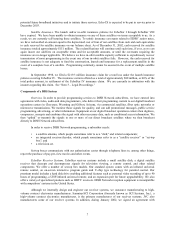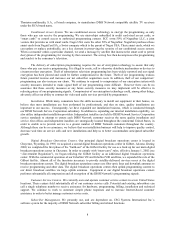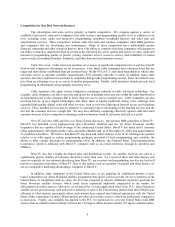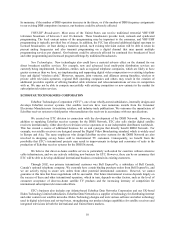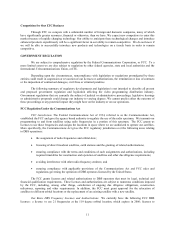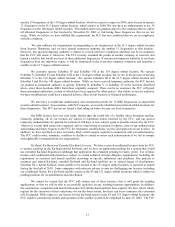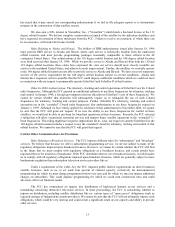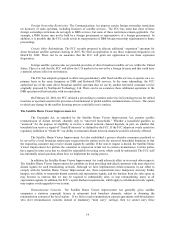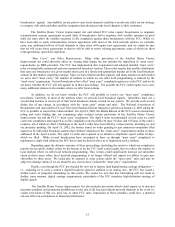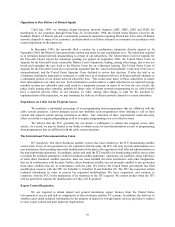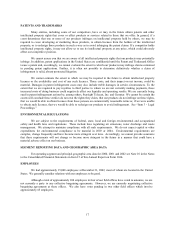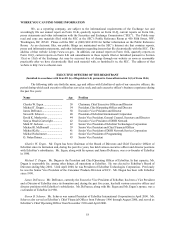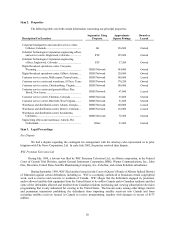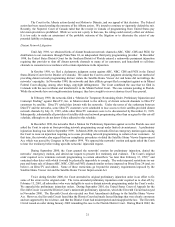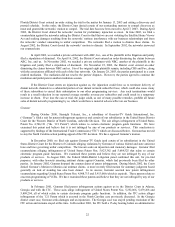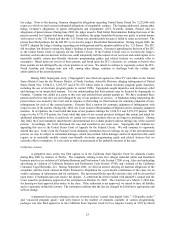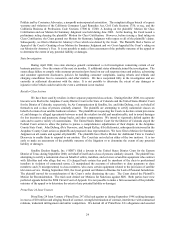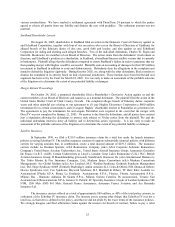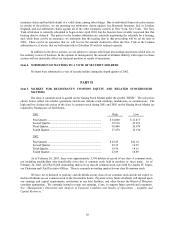Dish Network 2002 Annual Report Download - page 18
Download and view the complete annual report
Please find page 18 of the 2002 Dish Network annual report below. You can navigate through the pages in the report by either clicking on the pages listed below, or by using the keyword search tool below to find specific information within the annual report.16
Opposition to Our Delivery of Distant Signals
Until July 1998, we obtained distant broadcast network channels (ABC, NBC, CBS and FOX) for
distribution to our customers through PrimeTime 24. In December 1998, the United States District Court for the
Southern District of Florida entered a nationwide permanent injunction requiring PrimeTime 24 to shut off distant
network channels to many of its customers, and henceforth to sell those channels to consumers in accordance with
certain stipulations in the injunction.
In December 1998, the networks filed a motion for a preliminary injunction directly against us. In
September 2000, the District Court granted this motion and made several amendments to it. The injunction required
us to terminate distant network programming to certain of our subscribers. The United States Court of Appeals for
the Eleventh Circuit stayed the injunction pending our appeal. In September 2001, the United States Court of
Appeals for the Eleventh Circuit vacated the District Court’s injunction, finding, among other things, that it was too
broad and remanded the case back to the District Court for an evidentiary hearing. The United States Court of
Appeals for the Eleventh Circuit also rejected our argument that the “unserved households” restriction of the law is
unconstitutional, and the United States Supreme Court declined to review that decision. If after the trial or an
evidentiary hearing the injunction is reinstated, it could force us to terminate delivery of distant network channels to
a substantial portion of our distant network subscriber base. This could cause many of these subscribers to cancel
their subscription to our other services. Such terminations would result in a small reduction in our reported average
monthly revenue per subscriber and could result in a temporary increase in churn. If we lose the case at trial, the
judge could, among other remedies, prohibit all future sales of distant network programming by us, which would
have a material adverse effect on our business. In order, among other things, to plan for the potential re-
implementation of the injunction, we may terminate the delivery of distant network channels to certain subscribers.
Dependence on Cable Act for Program Access
We purchase a substantial percentage of our programming from programmers that are affiliated with the
cable system operators. Current program access law prohibits such programmers from refusing to sell us their
content and imposes certain pricing restrictions on them. Any relaxation of these requirements could adversely
affect our ability to acquire programming at all or to acquire programming on a cost-effective basis.
We believe that the FCC generally has not shown a willingness to enforce the program access rules
strictly. As a result, we may be limited in our ability to obtain access (or non-discriminatory access) to programming
from programmers that are affiliated with the cable system operators.
The International Telecommunication Union
ITU Standards. Our direct broadcast satellite system also must conform to the ITU broadcasting satellite
service plan. If any of our operations are not consistent with this plan, the ITU will only provide authorization on a
non-interference basis pending successful modification of the plan or the agreement of all affected administrations to
the non-conforming operations. Accordingly, unless and until the ITU modifies its broadcasting satellite service plan
to include the technical parameters of direct broadcast satellite applicants’ operations, our satellites, along with those
of other direct broadcast satellite operators, must not cause harmful electrical interference with other assignments
that are in conformance with the plan. Further, direct broadcast satellites are not presently entitled to any protection
from other satellites that are in conformance with the plan. We believe the United States government has filed
modification requests with the ITU for EchoStar I, EchoStar II and EchoStar III. The ITU has requested certain
technical information in order to process the requested modifications. We have cooperated, and continue to
cooperate, with the FCC in the preparation of its responses to the ITU requests. We cannot predict when the ITU
will act upon these requests for modification or if they will be granted.
Export Control Regulation
We are required to obtain import and general destination export licenses from the United States
Government to receive and deliver components of direct-to-home satellite TV systems. In addition, the delivery of
satellites and related technical information for the purpose of launch by foreign launch services providers is subject
to strict export control and prior approval requirements.



